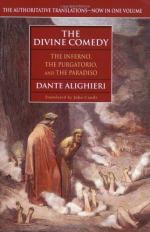Fell therefore; by what fate Sienna’s sons,
Each child in Campagnatico, can tell.
I am Omberto; not me only pride
Hath injur’d, but my kindred all involv’d
In mischief with her. Here my lot ordains
Under this weight to groan, till I appease
God’s angry justice, since I did it not
Amongst the living, here amongst the dead.”
List’ning I bent my visage down: and one
(Not he who spake) twisted beneath the weight
That urg’d him, saw me, knew me straight, and
call’d,
Holding his eyes With difficulty fix’d
Intent upon me, stooping as I went
Companion of their way. “O!” I
exclaim’d,
“Art thou not Oderigi, art not thou
Agobbio’s glory, glory of that art
Which they of Paris call the limmer’s skill?”
“Brother!” said he, “with tints
that gayer smile,
Bolognian Franco’s pencil lines the leaves.
His all the honour now; mine borrow’d light.
In truth I had not been thus courteous to him,
The whilst I liv’d, through eagerness of zeal
For that pre-eminence my heart was bent on.
Here of such pride the forfeiture is paid.
Nor were I even here; if, able still
To sin, I had not turn’d me unto God.
O powers of man! how vain your glory, nipp’d
E’en in its height of verdure, if an age
Less bright succeed not! imbue thought
To lord it over painting’s field; and now
The cry is Giotto’s, and his name eclips’d.
Thus hath one Guido from the other snatch’d
The letter’d prize: and he perhaps is born,
Who shall drive either from their nest. The
noise
Of worldly fame is but a blast of wind,
That blows from divers points, and shifts its name
Shifting the point it blows from. Shalt thou
more
Live in the mouths of mankind, if thy flesh
Part shrivel’d from thee, than if thou hadst
died,
Before the coral and the pap were left,
Or ere some thousand years have passed? and that
Is, to eternity compar’d, a space,
Briefer than is the twinkling of an eye
To the heaven’s slowest orb. He there
who treads
So leisurely before me, far and wide
Through Tuscany resounded once; and now
Is in Sienna scarce with whispers nam’d:
There was he sov’reign, when destruction caught
The madd’ning rage of Florence, in that day
Proud as she now is loathsome. Your renown
Is as the herb, whose hue doth come and go,
And his might withers it, by whom it sprang
Crude from the lap of earth.” I thus to
him:
“True are thy sayings: to my heart they
breathe
The kindly spirit of meekness, and allay
What tumours rankle there. But who is he
Of whom thou spak’st but now?”—“This,”
he replied,
“Is Provenzano. He is here, because
He reach’d, with grasp presumptuous, at the
sway
Of all Sienna. Thus he still hath gone,
Thus goeth never-resting, since he died.
Such is th’ acquittance render’d back
of him,
Who, beyond measure, dar’d on earth.”
I then:
“If soul that to the verge of life delays
Repentance, linger in that lower space,
Nor hither mount, unless good prayers befriend,
How chanc’d admittance was vouchsaf’d
to him?”




